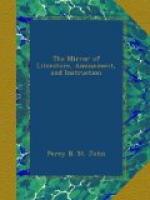The population of Brussels is rated at nearly 100,000, of which above 20,000 are paupers, supported by the government and voluntary contributions. The population is rapidly increasing. The number of foreigners in the winter of 1828 was between seven and eight thousand, of which half the number were English. Many families settle for a season, and take their flight south, or return home in June; but the greatest number are stationary for the education of their children. An English clergyman, formerly a teacher at Harrow, has an establishment for boys, well conducted, and the expense does not exceed fifty guineas a year. There are several seminaries for girls, also superintended by Englishwomen, with French teachers. Masters in every department are excellent, so that few places afford better schools for education.
The air in the upper part of the city is salubrious, and the climate, perhaps, better on the whole than England; but the winters are sharper, and the summers hotter; fogs are less frequent, and the spring generally sets in a fortnight earlier than in any part of Great Britain.
Our countrymen will be disappointed who settle in Brussels as a place of amusement, for no capital can be more dull; and the natives are not ready of access, which is probably as much the fault of their visitors as themselves. As a station for economy, it can be highly recommended, provided no trust is put in servants, and every thing is paid for with ready money. The writer of this article resided in Brussels for a dozen years, and he knows this from experience. If an establishment, large or small, is well regulated, a saving of fifty per cent, may be made, certainly, in housekeeping, compared with London. House-rent is dearer in proportion with other articles of living, and the taxes are daily augmenting. The horse-tax is more than double that of England; and the king of the Netherlands can boast that he is the only sovereign in Europe who has a tax on female labour. William Pitt attempted a similar measure, but was mobbed by the housemaids, and abandoned it.—New Monthly Magazine.
* * * * *
The Gatherer.
A snapper up of unconsidered trifles.
SHAKSPEARE.
* * * * *
CURIOUS DISCOVERY OF A ROBBERY.
Lysons in his “Environs of London,” says, “In a room adjoining to the south-side of the saloon, in the manor-house, at Charlton, in Kent, is a chimney-piece, with a slab of black marble so finely polished, that Lord Downe is said to have seen in it a robbery committed on Blackheath; the tradition adds, that he sent out his servants, who apprehended the thieves.” Dr. Plot makes the story more marvellous, by laying the scene of the robbery at Shooter’s Hill; he also says, “Thus in a chimney-piece at Beauvoir Castle, might be seen the city and cathedral of Lincoln, and in another at Wilton, the city and cathedral of Sarum.”




